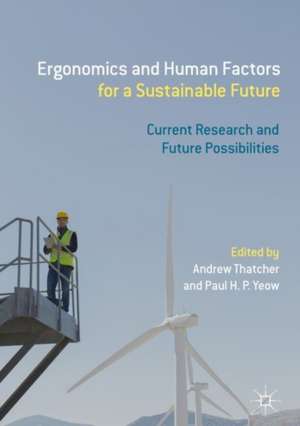Ergonomics and Human Factors for a Sustainable Future: Current Research and Future Possibilities
Editat de Andrew Thatcher, Paul H.P. Yeowen Limba Engleză Hardback – 11 apr 2018
| Toate formatele și edițiile | Preț | Express |
|---|---|---|
| Paperback (1) | 1110.41 lei 43-57 zile | |
| Springer Nature Singapore – 26 dec 2018 | 1110.41 lei 43-57 zile | |
| Hardback (1) | 1115.77 lei 43-57 zile | |
| Springer Nature Singapore – 11 apr 2018 | 1115.77 lei 43-57 zile |
Preț: 1115.77 lei
Preț vechi: 1360.70 lei
-18% Nou
Puncte Express: 1674
Preț estimativ în valută:
213.51€ • 223.48$ • 177.70£
213.51€ • 223.48$ • 177.70£
Carte tipărită la comandă
Livrare economică 31 martie-14 aprilie
Preluare comenzi: 021 569.72.76
Specificații
ISBN-13: 9789811080715
ISBN-10: 9811080712
Pagini: 402
Ilustrații: XVI, 396 p. 22 illus.
Dimensiuni: 148 x 210 x 31 mm
Greutate: 0.64 kg
Ediția:1st ed. 2018
Editura: Springer Nature Singapore
Colecția Palgrave Macmillan
Locul publicării:Singapore, Singapore
ISBN-10: 9811080712
Pagini: 402
Ilustrații: XVI, 396 p. 22 illus.
Dimensiuni: 148 x 210 x 31 mm
Greutate: 0.64 kg
Ediția:1st ed. 2018
Editura: Springer Nature Singapore
Colecția Palgrave Macmillan
Locul publicării:Singapore, Singapore
Cuprins
1. Introduction
2. A Sustainable System-of-Systems Approach: Identifying the Important Boundaries for a Target System in Human Factors and Ergonomics
3. Defining Sustainable and “Decent” Work for Human Factors and Ergonomics
4. Human Factors Issues in Responsible Computer Consumption
5. Human Factors and Ergonomics in Interactions with Sustainable Appliances and Devices
6. Human Factors and Ergonomics in the Individual Adoption and Use of Electric Vehicles
7. HFE in Biophilic Design: Human Connections with Nature
8. Building Sustainable Organisations: Contributions of Activity-Centred Ergonomics and the Psychodynamics of Work
9. Green Buildings: The Role of HFE
10. Human Factors and Ergonomics: Contribution to Sustainability and Decent Work in Global Supply Chains
11. Natural Resource Use, Institutions, and Green Ergonomics
12. Examining the Challenges of Responsible Consumption in an Emerging Market
13. Promoting Green Technology Financing: Political Will and Information Asymmetries
14. Lives We Have Reason to Value
15. Ergonomics and Human Factors for a Sustainable Future: Suggestions for a Way Forward
Notă biografică
Andrew Thatcher is Professor of Industrial and Organisational Psychology at the University of the Witwatersrand, Johannesburg. His research focuses on understanding sustainable work systems. He is Chair of the International Ergonomics Association’s Technical Committee on ‘Human Factors for Sustainable Development’ and is one of the editors of the journal Ergonomics.
Paul H.P. Yeow is Associate Professor and former Head of Marketing Discipline at the School of Business, Monash University Malaysia. Paul has completed 14 research funded projects related to human factors, sustainable production, information systems and marketing and published over 50 journal articles. He is a member of editorial board of Applied Ergonomics.
Paul H.P. Yeow is Associate Professor and former Head of Marketing Discipline at the School of Business, Monash University Malaysia. Paul has completed 14 research funded projects related to human factors, sustainable production, information systems and marketing and published over 50 journal articles. He is a member of editorial board of Applied Ergonomics.
Textul de pe ultima copertă
“This book is an interesting compilation of different perspectives on HFE in the sustainable development field. The book is multidisciplinary and multi-context, with authors drawing examples from developing and developed countries to provide balanced and inclusive solutions to sustainability challenges.”
— Professor Jörgen Eklund, KTH Royal Institute of Technology, Sweden
"All of the current researchers publishing in this field are well-represented, as is an overarching vision of the human contribution to sustainability. The matters presented in this book are of utmost importance, not only to ergonomists but to the world at large."
—Colin Drury, University at Buffalo, State University of New York, USA
“By stretching the borders of the discipline and profession, the authors show how HFE’s unique features of design-orientation, systems approach, and combining well-being and performance, can be utilized to facilitate sustainability. The book can inspire HFE researchers, teachers and practitioners to contextualize and expand their current work, and to contribute to a sustainable future."
—Professor Jan Dul, Erasmus University, The Netherlands
This book focuses on different sustainable products and services, such as electrical vehicles, green buildings, and biophilic and biomimetic systems, at multiple hierarchical levels within its chapters. The authors reflect on individual, organisational, governmental, political, and moral considerations of how Human Factor Ergonomics can build a sustainable future. This book is a must-read for anyone concerned with environmental issues and sustainability.
Andrew Thatcher is Professor of Industrial and Organisational Psychology at the University of the Witwatersrand, Johannesburg. His research focuses on understanding sustainable work systems. He is Chair of the International Ergonomics Association’s Technical Committee on ‘Human Factors for Sustainable Development’ and is one of the editors of the journal Ergonomics.
Paul H.P. Yeow is Associate Professor and former Head of Marketing Discipline at the School of Business, Monash University Malaysia. Paul has completed 14 research funded projects related to human factors, sustainable production, information systems and marketing and published over 50 journal articles. He is a member of editorial board of Applied Ergonomics.
Caracteristici
Introduces a new and exciting field of research in Human Factors and Ergonomics
Integrates scholars from around the world and from many different disciplines
Offers a definitive assessment of a still nascent-field of sustainability within Human Factors and Ergonomics
Integrates scholars from around the world and from many different disciplines
Offers a definitive assessment of a still nascent-field of sustainability within Human Factors and Ergonomics
